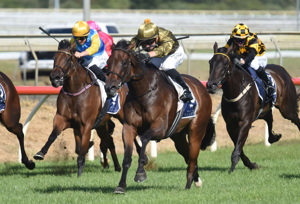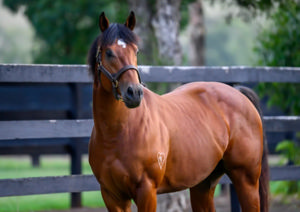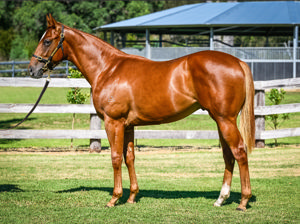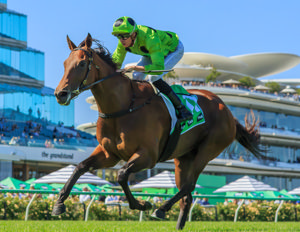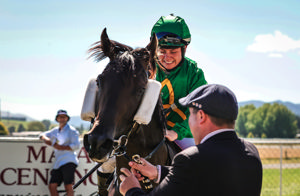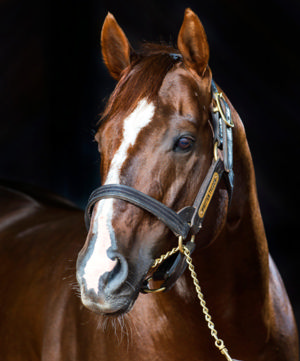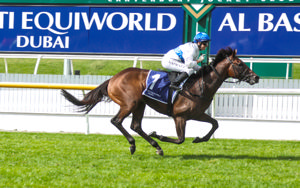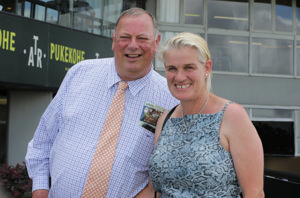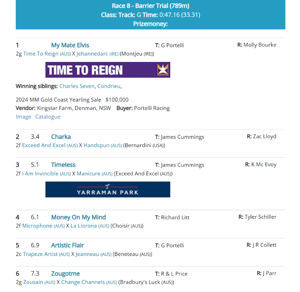
Main Stage - Grant Courtney
"I always buy at that sale. I do a little bit of homework. With this mare I thought if I got her at the right price I would buy her," Harrison said.
"I make up my mind to spend somewhere between $15,000 and $30,000. At that stage Main Stage was placed at Warrnambool, and I figured that a Reliable Man that was placed at two must have some ability."
Main Stage resumed from a break with a placing in a maiden at Cranbourne before winning at Kilmore.

Tim Harrison
He is the third foal of the Prized mare Kiri, a winner of eight races including the Cornwall Handicap and Kiwifruit Cup when they were both contested at Listed level. She has also left two winners; Kiriana Belle and Augustace by Swiss Ace.
"Every year I go to the sales I go through the pedigrees and select an older Stakes winning mare. I see what is running for her. I look for opportunities, and tend to buy mares for not much more than the service fee of the foal they are carrying".
"No one wants old mares, they believe there is no risk in a young mare, but buyers still expect there to be yearlings at the sales and to race," he said.
"So usually you are not competing with many people when you are buying older mares. Most of the time they are mares that the studs are quitting that are in that 12-14 age bracket and by that stage they should have a few foals coming through."
This was the case with Kiri, and she was offered on behalf of Greg Perry's Greenwich Stud Pty Limited by Kilmore Farm in Matamata. According to Michelle Norman who owns Kilmore Farm with her veterinarian husband Dave Keenan, Perry has a lot of mares and he felt that at 14 she was unproven and should be sold.
He did keep the then yearling filly and the weanling colt also by Reliable Man and the filly is in the Kilmore Farm draft for the 2017 Ready To Run sale next month.
"She's an athletic, physical type of filly," said Norman who also prepared and sold Main Stage to her current trainers Trent Busuttin and Natalie Young.
"Reliable Man has certainly improved the physicality of her foals. Greg keeps a number of mares in New Zealand, and sends other mares over to be mated from time to time. He is appreciative and highly respects the New Zealand bred product and the way horses are raised here."
Perry is also a shareholder in Vinery Stud in New South Wales and is probably best known as the breeder of the champion Australian race horse Atlantic Jewel and her Stakes winning half-sister Commanding Jewel.
Getting back to Harrison and his recipe for success, he believes that generally you will find that a Stakes winning mare will leave a Stakes winner or a good horse, but it won't necessarily be the first foal. Often it's the third or fourth foal that makes the mare.
"Kiri had two foals to race who were both winners, and had a two-year-old, a yearling and a weanling by Reliable Man coming through. There were no opportunities below that as there is nothing happening with the grandam anymore.
"In this case Kiri had a late service as well and that deters people. I will decide when I see the foal what I will do with her this season. I have a share in Reliable Man so I can go there. I will wait and see if Main Stage wins the Derby or not.
"When you buy a mare like this you have the foal she is carrying and at least three others going for you that you have invested in."
Using this method Harrison has purchased around 20 mares and more than a dozen of them have produced a Stakes winner either after he has purchased them or he has bred a Stakes winner himself from them.
They were all well performed race horses or Stakes winners and just about every one of those mares was over 12 years old.
"There is a lot of misinformation in the game surrounding older mares. To me it's about probability and pedigree, it's a little formula that has kept me in the game, though it hasn't made me a fortune," he mused. – Michelle Saba, NZTBA

